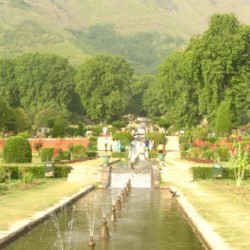Kashmir – A meeting of three cultures

Kashmir – A meeting of three cultures
Kashmir is the northernmost state of India, a state of breathtaking beauty with the high HimalayanMountains, gushing rivers and pristine lakes. The flora and fauna are of an alpine and temperate variety, very different from those found in the tropical plains of the country. Kashmir includes the regions of Ladakh in the east and Jammu in the south, which is why
the state has been given the official name of Jammu and Kashmir, or J&K for short. The capital city is Srinagar, situated on the picturesque Dal and NaginLakes with the river Jhelum flowing through.
Jammu is home to the Hindu Dogra hill tribes who speak Dogri and Hindi, whereas in Kashmir the majority of the population is Sunni Muslims, who speak Kashmiri and Urdu. Further to the east lies the region of Ladakh, where one can meet an ancient form of Tibetan Buddhism, with Tibetan and Ladakhi as the local languages. Thus the state of J&K is indeed a meeting of three cultures based upon the religions of Hinduism, Islam and Buddhism, with some of the holiest shrines of all three religions to be found in this remarkable state.
The people of Kashmir are noble, good hearted and generous, true to their Aryan heritage (Arya in Sanskrit means noble). They are well spoken and intelligent, as also gifted with their hands, making the most exquisite artifacts, jewellery, woolen cloth and clothing. Agriculture, horticulture and sheep/cattle herding are important activities. Fruit orchards and kitchen gardens provide for their daily meals and the endless paddy fields give the staple rice which is eaten twice a day. Kashmiri tea is unique. It is called “Kahva” and is brewed with cinnamon, saffron, rose petals and cardamom.
The state government seems to do a lot for the population of J&K; there are schools and hospitals and well constructed roads with good public transport in most places. The infrastructure is generally better than in some other states of India. There are aesthetically created Moghul gardens in most towns and cities and people are sensitive to cleanliness and beauty. Both men and women wear traditional clothes and the women do not cover their
faces.
To the west of J&K is Pakistan, to the north Afghanistan and Tajikistan, and to the east is Tibet/China, so it is clear to see that the state has a strategic position like no other in India. J&K has had a turbulent history and is considered to be disputed territory. Since 1989 there have been many insurgencies from the side of the militants. The ruling government has had to use a large army presence to maintain peace and order in the state. Militancy has decreased somewhat, but one cannot predict when it may flare up again.
In January 2007 I received a letter from a Kashmiri gentleman called Ghulam Mohamed Rather from Ganderbal district near Srinagar. He had been on a visit to Kolkata where he received the book “Vision and Action for Another World” edited by Ulrich Roesch. The
first article in the book has been written by me, followed by articles by others, mainly Anthroposophists. Mr. Rather sent letters to all the authors in this book, but only received a reply from me. Thus we entered into correspondence and I discovered that his main interests were Bio Dynamic Agriculture and Waldorf Education.
Mr. Rather has a large circle of friends and relatives and soon he had spread this information about Rudolf Steiner and Anthroposophy many others. People like Ghulam Hassan Rather (his cousin) principal and chairman of H.K.M.C.School in Ganderbal and Abdul Rehman of Public School Wakura expressed their wish for an introductory course in Waldorf Education. We also received a request from Mushtaq Ahmed who is the head of the NGO “J&K Development Action Group” for information about the Three Fold Social Order which seems
to find a resonance among his group.
With so much interest being shown, and so many people keen on receiving knowledge about Anthroposophy, my sister Dilnawaz and I decided to go to Kashmir in the middle of July to give the required courses. We were received with great warmth and we stayed
in the home of our host Gh. Moh. Rather and his wife and three grown up children in a lovely cottage in the village of Yarmuqam, overlooking fields and hills and forests and also with Mr. Ahmed Azizand his family.
We spent the next days giving courses in Waldorf Education, Eurythmy and Anthroposophy at the two schools mentioned earlier and at the NGO J&K DAG. The participants were all Kashmiris who spoke good English and Urdu (we speak Hindi, which is similar to
Urdu). There is tremendous potential here; the young adults who attended our courses, both men and women, are seeking new realms of thinking and knowledge and are very open to different ideas. The ensuing discussions we had were most inspiring. Really, we had not
expected such a positive response!
It is very important to continue the dialogue thus begun, and to ensure that this enthusiasm is met with the right understanding and cooperation from the side of Anthroposophy. These
remarkable people in Kashmir are glad to receive visitors who are also able to contribute and in return experience the excellent Kashmiri hospitality and way of life.
~ ABAN BANA
